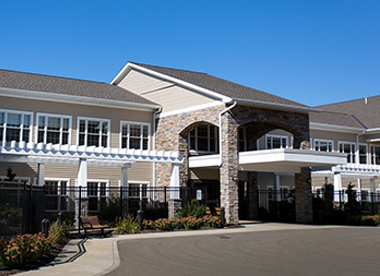Paying for Healthcare
Paying for Healthcare
Answers to frequently asked questions.
“Does Medicaid or Medicare pay for senior living?” “How much does assisted living cost?” “Are there government programs that help pay for senior care?” If you’ve asked yourself these questions, you’re not alone. Determining healthcare coverage is confusing, especially if you have a time-sensitive need.
Presbyterian SeniorCare Network wants to be your go-to resource for helpful information. Turn to us for help in Making Aging Easier®—and for making care more manageable and affordable.
Outlined below is the coverage you can expect to receive from Medicare and other agency programs for specific services. If you don’t see the answers you’re looking for, please don’t hesitate to contact us.
For the most up-to-date and detailed information on Medicare coverage, download a copy of the handbook “Medicare & You” in the format of your choice: Click Here
Your level and type of care determine what Medicare will cover. Medicare may cover the cost for care provided by a skilled professional, such as a physical or occupational therapist. It will not reimburse the cost of independent living or personal care.
For more than 30 years, Presbyterian SeniorCare Network has provided affordable senior housing in all sizes and types—from condominiums to high-rise apartments for income-qualified seniors and persons with disabilities in the western Pennsylvania area.
Through our SeniorCare Network team, we manage housing for seniors and persons with disabilities at more than 30 locations. Eligibility depends on the way each site is funded. Contact us for more information about affordable senior housing.
For a Medicare-eligible beneficiary, Medicare Part A coverage pays for a semi-private room, meals, nursing services, rehabilitation services, medications, supplies and durable medical equipment for up to 100 days. For the first 20 days in a nursing home, Medicare covers 100% of skilled care. From Day 21 through Day 100, the resident must pay a daily co-insurance rate.
Patients who are eligible for the services covered under Medicare Part B will be responsible for an annual deductible plus 20% of the total charges for services such as occupational therapy, physical therapy and speech therapy, as well as medical supplies.
For additional information on Medicare’s skilled nursing care coverage, please visit https://www.medicare.gov/medicare-and-you
For those Medicare beneficiaries with Part B coverage, Medicare helps pay for medically necessary physical, occupational therapy and speech-language pathology services if a doctor or therapist:
- Sets up a treatment plan
- Periodically reviews the plan to see how long the patient will require therapy
You can receive outpatient rehabilitation services from a participating:
- Hospital
- Skilled Nursing Facility
- Home Health Agency
- Rehabilitation Agency
- Public Health Agency
You can also receive these services from a Medicare-approved physical or occupational therapist, in private practice. You will need to pay 20% of the Medicare-approved amount, and the Part B deductible applies.
To be eligible for Medicare home health coverage, a Medicare-eligible patient must be homebound, under a physician’s care and in need of medically necessary skilled nursing, physical therapy, speech-language pathology services or continued occupational therapy. A physician must authorize and periodically review the patient’s home health care plan, and the home health agency must be approved by the Medicare Program (Medicare-certified).
The patient may be billed for:
- Medical services and supplies that Medicare doesn’t pay for
- 20% of the Medicare-approved amount for Medicare-covered medical equipment such as wheelchairs, walkers, and oxygen equipment.
AseraCare Home Health is a Medicare-certified home health agency. For more information on what areas they serve and how they can help, please click here.
For additional information on Medicare’s home healthcare coverage, please visit https://www.medicare.gov/medicare-and-you
When a Medicare-eligible patient receives services from a Medicare-approved hospice agency, Medicare will pay for the services and supplies directly related to the patient’s hospice diagnosis.
Covered services directly related to the patient’s hospice diagnosis:
- Doctor care
- Nursing care
- Drugs for pain relief and those related to the terminal illness
- Counseling services for the patient and family members
- 13-month bereavement counseling for family members
Covered medical supplies directly related to the patient’s hospice diagnosis:
- Hospital beds and routine mattress changes
- Walkers, canes, and crutches
- Respiratory equipment
- Patient lifts
- Shower/bath chairs
- Bedside commodes
- Catheters, syringes, dressings, and latex gloves
- Incontinence supplies
Under Medicare law, no person will be refused hospice care due to inability to pay. AseraCare Hospice, a Medicare-approved hospice agency, has financial specialists on staff to answer your questions about receiving financial assistance. Funds may be available from donations, gifts, grants, or other community sources to help cover the cost of care.
For additional information on Medicare’s hospice care coverage, please visit https://www.medicare.gov/medicare-and-you
Medicare does not generally pay for long-term care, or for help with activities of daily living, including eating, bathing, dressing, and using the bathroom.
However, all states provide long-term care services for individuals who are Medicaid-eligible and qualify for institutional care.
For additional information on Medicare’s long-term care coverage, please visit https://www.medicare.gov/medicare-and-you
If a resident depletes all resources through no fault of their own, we will explore all available financial options to assist you. Contributions to our Caring for Life program help to ensure that we can continue to provide high-quality care and support at an affordable cost.
The following government programs also provide coverage for the types of healthcare services listed above. However, the Centers for Medicare & Medicaid Services and the U.S. Department of Veterans Affairs have different eligibility requirements that we’ve outlined below.
- Medicare Part C, D and Medigap
- Medicare Advantage or “Medicare Part C”
Medicare Advantage, sometimes called Medicare Part C, is another healthcare coverage choice you have as part of Medicare. These plans are offered by private companies approved by Medicare, and provide all of your Part A and B coverage except for hospice care. However, original Medicare will provide hospice care even if you are in a Medicare Advantage Plan.
For additional information on Medicare Advantage, please visit https://www.medicare.gov/medicare-and-you
Medicare Part D—Medicare’s Prescription Drug Coverage
To get Medicare’s prescription drug coverage, you must join a plan run by an insurance company or other private company approved by Medicare. Each plan varies in cost and the types of drugs covered.
Medigap—Medicare’s Supplemental Coverage
Medigap policies are sold by private insurance companies. They help pay for some of the healthcare costs (“gaps”) that original Medicare doesn’t cover—like copayments, coinsurance, and deductibles.
Healthcare benefits are only offered to certain veterans or to veterans under special situations:
- Long-term care services for veterans: If the individual is at least 70% disabled due to a service-related injury or illness. A physician’s authorization is necessary.
- Home health care services for veterans: If the individual is at least 50% disabled due to a service-related injury or illness. A physician’s authorization is necessary.
For more information, visit the U.S. Department of Veterans Affairs website at www.va.gov.
If you have managed care—private insurance through your work or individually—you will need to check with your employer’s Benefits Manager, or your insurance provider directly to find out what is covered under your policy. Plans vary widely on the healthcare services they cover.




